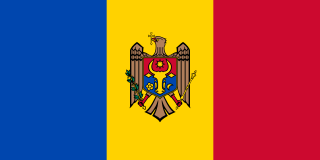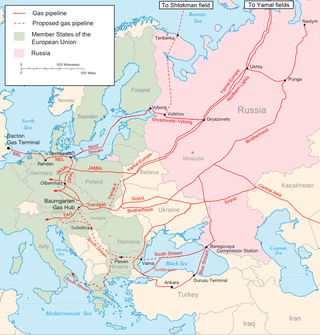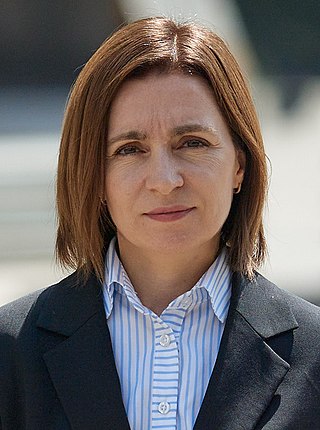Related Research Articles

Moldova, officially the Republic of Moldova, is a landlocked country in Eastern Europe, on the northeastern corner of the Balkans. The country spans a total of 33,483 km2 and has a population of approximately 2.5 million as of January 2023. Moldova is bordered by Romania to the west and Ukraine to the north, east, and south. The unrecognised breakaway state of Transnistria lies across the Dniester river on the country's eastern border with Ukraine. Moldova is a unitary parliamentary representative democratic republic with its capital in Chișinău, the country's largest city and main cultural and commercial centre.

Transnistria, officially the Pridnestrovian Moldavian Republic (PMR), is an unrecognised state internationally considered to be part of Moldova. Transnistria controls most of the narrow strip of land between the Dniester river and the Moldovan–Ukrainian border, as well as some land on the other side of the river's bank. Its capital and largest city is Tiraspol. Transnistria has been recognised only by three other unrecognised or partially recognised breakaway states: Abkhazia, Artsakh and South Ossetia. Transnistria is officially designated by the Republic of Moldova as the Administrative-Territorial Units of the Left Bank of the Dniester or as Stînga Nistrului. In March 2022, the Parliamentary Assembly of the Council of Europe adopted a resolution that defines the territory as under military occupation by Russia.

The Russia–Ukraine gas disputes refer to a number of disputes between Ukrainian oil and gas company Naftogaz Ukrayiny and Russian gas supplier Gazprom over natural gas supplies, prices, and debts. These disputes have grown beyond simple business disputes into transnational political issues—involving political leaders from several countries—that threaten natural gas supplies in numerous European countries dependent on natural gas imports from Russian suppliers, which are transported through Ukraine. Russia provides approximately a quarter of the natural gas consumed in the European Union; approximately 80% of those exports travel through pipelines across Ukrainian soil prior to arriving in the EU.

Relations between the European Union (EU) and Moldova are currently shaped via the European Neighbourhood Policy (ENP), an EU foreign policy instrument dealing with countries bordering its member states.

The Cuciurgan power station, the largest power station of Moldova, is located in Dnestrovsc, Transnistria, on the shores of the Cuciurgan Reservoir bordering Ukraine. Commissioned on 26 September 1964, the facility produced as of 2021 about 79% of Moldova's electricity.

Moldova–Russia relations are the bilateral relations between the Republic of Moldova and the Russian Federation, two Eastern European, post-Soviet, ex-communist countries. Russian support for the self-proclaimed Pridnestrovian Moldavian Republic (Transnistria) and a substantial Russian military presence therein strained Moldovan relations with Russia.

In 2009, Russian natural gas company Gazprom refused to conclude a supply contract unless Ukrainian gas company Naftogaz paid its accumulating debts for previous gas supplies. The dispute began in the closing weeks of 2008 with a series of failed negotiations, and on January 1, 2009 Russia cut off gas supplies to Ukraine. On January 7 the dispute turned to crisis when all Russian gas flows through Ukraine were halted for 13 days, completely cutting off supplies to Southeastern Europe, most of which depends on Russian gas, and partially to other European countries.

Russia supplies a significant volume of fossil fuels to other European countries. In 2021, it was the largest exporter of oil and natural gas to the European Union, (90%) and 40% of gas consumed in the EU came from Russia.

Energy in Moldova describes energy and electricity production, consumption and import in Moldova.
Dorin Recean is a Moldovan economist and politician serving as Prime Minister of Moldova since February 2023. Since 2022 he has also served as Presidential Advisor on Security, and Secretary General of Moldova's Supreme Security Council. He previously served as Interior Minister of Moldova from July 2012 to February 2015. He has extensive experience in the private sector and in the IT industry with a specialisation in data, including big data, and information analysis. He also worked in development institutions and was previously a lecturer at several universities.

Maia Sandu is a Moldovan politician who has been the President of Moldova since 24 December 2020. She is the founder and former leader of the Party of Action and Solidarity (PAS) and former Prime Minister of Moldova from 8 June 2019 until 14 November 2019, when the government collapsed after a vote of no-confidence. Sandu was Minister of Education from 2012 to 2015 and member of the Parliament of Moldova from 2014 to 2015, and again in 2019.

Nicolae "Nicu" Popescu is a Moldovan author and diplomat serving as Minister of Foreign Affairs and European Integration of Moldova since 6 August 2021 in the Gavrilita and then Recean cabinets. He was also Moldova's Foreign Minister in the period of 11 June - 14 November 2019 in the Sandu Cabinet. Until his appointment, he was the director of the Wider Europe programme of the European Council on Foreign Relations and visiting professor at Sciences Po-Paris.
During the COVID-19 pandemic, Romania has supported Moldova on several occasions, supplying it with medical equipment and supplies, volunteer Romanian experts and doctors and even a series of COVID-19 vaccine units that arrived on 27 February 2021, which allowed Moldova to start its vaccination program.

The 5+2 format, also known as the 5+2 talks, the 5+2 negotiations and the 5+2 process, is a diplomatic negotiation platform aimed at finding a solution to the Transnistria conflict between Moldova and the unrecognized state of Transnistria. It is composed of the latter two, which are designated as "parties to the conflict", and Russia, Ukraine and the Organization for Security and Co-operation in Europe (OSCE), "mediators" of the negotiations. The European Union (EU) and the United States act as "observers". The inclusion of Romania into the 5+2 format has been proposed.
Events from the year 2022 in Moldova.
The 2021–2022 global energy crisis has caused varying effects in different parts of the world.

On 18 September 2022, protests in Moldova began in the capital city of Chișinău, demanding the resignation of the country's pro-Western government, amid an energy crisis causing rising natural gas prices and inflation, caused in part by the war in Ukraine.
Events from the year 2023 in Moldova.
As part of the sanctions imposed on the Russian Federation as a result of the Russo-Ukrainian War, on 3 December 2022, the European Union (EU) agreed to cap the price of natural gas in order to reduce the volatility created by Russia in the gas market.
Following the Russian invasion of Ukraine, Moldova accepted Ukrainian refugees, opened a bank account for donations, and unofficially imposed sanctions on Russia.
References
- 1 2 Cojan, Liviu (25 October 2022). "Maia Sandu: Republica Moldova se confruntă cu cea mai gravă criză energetică din istoria sa". Digi24 (in Romanian).
- ↑ Călugăreanu, Vitalie (21 October 2022). "Criza energetică generată de Putin poate duce la dispariția enclavei separatiste Transnistria" (in Romanian). Deutsche Welle.
- ↑ "Moldova Suffered Blackouts After Russian Strikes on Ukraine". Bloomberg.com. 15 November 2022.
- ↑ "Ukraine war: Zelensky denounces Russian 'terror' in UN address". BBC News. 23 November 2022.
- ↑ "Most Moldovan power supplies restored after Russian strikes on Ukraine". Reuters. 23 November 2022.
- ↑ "Russia's Ukraine invasion is fueling an energy crisis in neighboring Moldova". Atlantic Council. 5 December 2022.
- ↑ Necșuțu, Mădălin (9 November 2022). "How an energy crisis is testing Moldova's mettle to turn away from Russia". Euronews.
- ↑ Jack, Victor (9 November 2022). "Moldova will ask EU allies for €450M amid fears Putin will cut gas flows". Politico Europe .
- ↑ Cenușă, Denis (16 November 2022). "COMMENT: Russian tactics against Ukraine hit Moldovan energy sector". bne IntelliNews.
- ↑ Neagu, Bogdan (14 October 2022). "Romania to cover Moldova's electricity deficit caused by Russia bombing". Euractiv .
- ↑ Gava, Ioan Radu (13 October 2022). "Rusia s-a prăbușit în ochii cetățenilor Republicii Moldova: România ne ajută cel mai mult / Deputat PAS, despre procentul unioniștilor: Va veni ziua în care 50%+1 își vor dori Unirea". DC News (in Romanian).
- ↑ "EU announces $250 million package to help Moldova tackle harsh energy crisis". Radio Free Europe/Radio Liberty. 10 November 2022.
- ↑ "Ultima oră! Lista Guvernului Recean, făcută publică: Noi șefi la Justiție și Finanțe, iar Alaiba și Bolea, ridicați în rang". Unimedia (in Romanian).
- ↑ "Moldova: diversifying supplies and curbing Gazprom's influence". 15 June 2023.